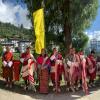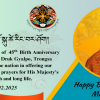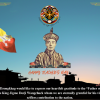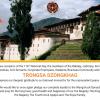Tsheringma Drupchhu
The small spring located at Tangsibji village in central Bhutan is considered the holy water of goddess Tsheringma. The spring sprouts out from a small catchment area from the middle of a meadow located on a hill believed to be the citadel of the local deity Dragpa Gyaltshen (also known as Seju Gentse or simply Agay Yosey).
The residents of Tangsibji village revere the deity as their khelha (natal deity), yuelha (village deity), and dralha (protector deity). In earlier times, He is said to impregnate local girls and His offspring were known for their super human strength. Due to the reverence to the deity, the areas surrounding His citadel have very minimum human interference. However, the entire villagers use the meadow as a grazing ground for their bulls for few days very year.
As per oral history, a tsipoem (lead singer) from Tangsibji was commanded by the king to come and sing at his palace. The palace is located at a day’s journey at Kuenga Rabten. On the last night before her journey, she dreamt of a woman instructing her to visit the source of the spring (known as “Ba-Khey-Thong-Sa”, place where the bulls drink water), take a head shower, and drink the water before starting her journey to the palace. At dawn, she followed the instructions given to her in her dream, and journeyed to the palace with her troupe.
It is said that during the performance of the Mangde Tangsibji Zhyem (classical song believed to have been originated from Tangsibji), her melodious voice even made the king weep. As a reward for her voice, she was gifted with wetland (used for paddy cultivation) and other gifts by the king.
Later, when the Padseling Trulku – a reincarnate priest held highly by the locality – visited the village, the tsipoem narrated her dream and the outcome to the trulku. Based on significance, the trulku confirmed the spring water as the holy water of goddess Tsheringma.
Goddess Tsheringma is believed to be a mountain goddess who is the head of five Tshering sister goddesses. These goddesses were believed to be: war deities, if high officials seek blessings of power; gods of wealth, if people seek blessings of wealth; gods of speech, if youths seek eloquence and pleasing voice; and others.
Even now, the village dance troupe visits the drupchu to take head shower and invoke the local deity before they venture out to perform at important occasions. The dancers would perform the Tangsibji Zhyem as an offering to appease and seek protection and guidance from the local deity.
The common believe is that if the Tsheringma Drupchu is the first drop of water a child drinks, the child will grow up with a melodious voice.



